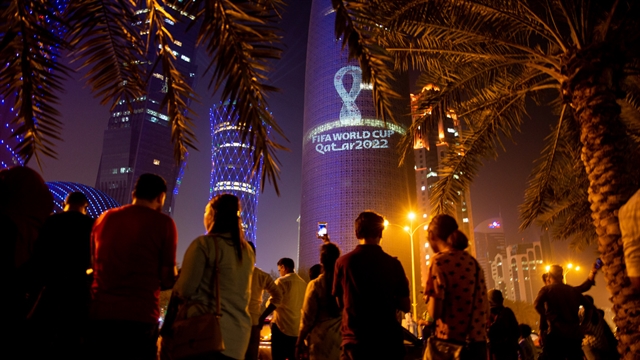 Life & Style
Life & Style

On the occasion of the National Day of Qatar, Ambassador Mohamed bin Ismail Al Emadi sends a message to celebrate.

|
| Crowds watch the unveiling of the FIFA World Cup Qatar 2022 emblem along Doha’s Corniche. Photo courtesy of the embassy |
On the occasion of the National Day of Qatar, Ambassador Mohamed bin Ismail Al Emadi sends a message of celebration.
The State of Qatar is a sovereign country located in the Middle East covering an area of 11,521sq.km. Doha is the capital and the largest city.
The timeline of Qatar’s modern history begins in the 19th century when all tribes gathered under the rule of the Al Thani family. This paved the way for more stability in the country, independence from neighbouring countries, and the forging of balanced relations with different influential parties in the region.
In 1868, Sheikh Mohammed bin Thani signed an agreement with the British authorities in the Gulf that recognised Qatar as an independent political entity. By virtue of this agreement, Britain promised to protect Qatar against any external aggression.
Qatar’s young leadership is led by the Amir, and his highness sheikh Tamim bin Hamad Al-Thani is a unique case in the region. Qatar’s national vision for 2030 is inspired by the Father Amir Sheikh Hamed bin Khalifa Al-Thani who launched a clear path for Qatar’s future. It aims to propel Qatar forward by balancing the accomplishments that achieve economic growth with human and natural resources. This vision guides the economic, social, human and environmental development of the country. Sheikh Tamim, who is the commander in chief of Qatar’s armed forces, has advanced a vision to cement Qatar’s leading position on the international arena economically and politically. The Amir’s commitment through constant daily contact with the people and society is unmatched.
Oil and gas are the two key components of Qatar’s economy. Their revenue has enabled Qatar to expand its development plans and investments in all domains: industrial, economic and scientific research, both domestically and abroad. Qatar has one of the world’s strongest economies. In 2016, Qatar was among the top 10 richest economies in nominal terms.
Qatar’s robust economy and high revenue is utilised in development mega projects ranging from infrastructure to industry, while supporting foreign investment and the private sector is another manifestation of Qatar’s economic growth. Unemployment rates are among the world’s lowest, with a record low of 0.10 per cent in the first quarter of 2017.
Above all, Qatar’s robust economy is maintaining a balance between oil-based and knowledge-based models. Such diversity enables the country to minimise its reliance on hydrocarbon activities which in turn boosts the role played by the private sector to maintain competitiveness.
Qatar’s 2030 national vision aims to achieve social development on a national scale in order to foster a healthy and capable national workforce, The Qatar National Vision (QNV) 2030 priorities are human development, improved education and healthcare, and increased cultural awareness and employment opportunities for nationals are the cornerstones of the human development strategy. A large emphasis is placed on the young population in this regard. The low rate of Qataris joining the workforce is outlined as a major challenge to human development. Qatar has launched a number of initiatives to encourage national talents. Qatarisation is crucial to the human development pillar as it contributes towards the employment of Qatari citizens.
Qatar is one the world’s fastest growing countries as a result of the country harnessing its resources to development in all sectors including tourism, which is now a strong contributor to the economy and an incentive to investment in natural and manmade resources. It also stands as a manifestation of the country’s modernity. Tourists can enjoy a variety of cultural, sports and historic festivities in addition to a range of marine and desert adventures. Sports take the lead with international events ranging from horse and camel racing to speedboating. Qatar will also host of the FIFA 2022 World Cup Finals, making it the first Arab country to organise the event.
Việt Nam and Qatar officially established diplomatic relations on February 8, 1993. The two countries have witnessed 27 years of smooth and rapid development in several prominent sectors. Politics, diplomacy, trade, investment, oil and gas production co-operation, tourism and workforce supply are among the most important fields the two countries look forward to in every exchange visit of high-ranking officials. The presence of Qatar Airways and Qatar Nation Bank (QNB) in Việt Nam is considered the foothold for economic development and co-operation of the two nations in the coming years. VNS